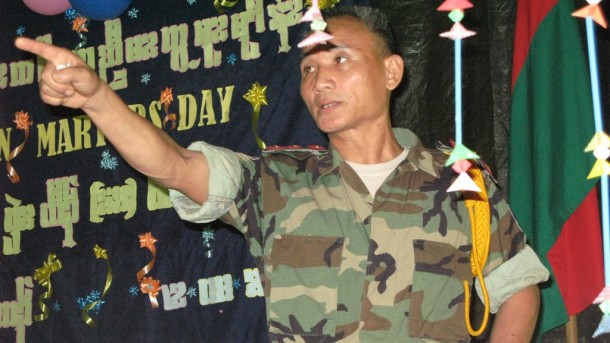The commander of the Karen National Liberation Army (KNLA) Brigade 5, Brig-Gen Baw Kyaw Heh, has been appointed as acting commander-in-chief of the KNLA following the dismissal of Gen Mutu Say Poe on Wednesday, according to sources close to the Karen rebels.
The KNLA’s political wing, the Karen National Union (KNU), dismissed Mutu Say Poe by letter along with two central committee members, David Taw and Roger Khin, for repeatedly violating KNU protocol, according to KNU official Say Say who added that an official appointment will be made during the next regular military meeting.
KNU joint-secretary 2, Daw Lay Mu, will reportedly take over David Taw’s position in the Justice Department.
KNU sources said that the letter dismissing Mutu Say Poe, David Taw and Roger Khin was signed by joint-secretary 1 Hla Ngwe and 10 other central committee members.
Mutu Say Poe led a faction of the KNU last week to Karen State capital Pa-an where they allegedly opened a liaison office in collusion with the Burmese government without informing the KNU central committee.
KNU sources said that Mutu Say Poe and his followers have ignored several meetings called by the central committee which is currently led by General-Secretary Zipporah Sein.
Reports suggest that Mutu Say Poe and his followers have deliberately ignored the KNU central committee’s requests and are engaged in a move to split from the organization. A Karen military source estimated that Mutu Say Poe will garner support from KNLA Brigades 1, 3, 4, 6 and 7, while Brigades 2 and 5 will stand loyal with the KNU central committee. The seven KNLA brigades command an estimated 10,000 fighters in total.
Observers at the Thai-Burmese border speculated that the split in the KNU’s ranks would result in a north-south divide: a northern faction in Karen State led by Baw Kyaw Heh, and a southern faction commanded by Mutu Say Poe.
Due to the internal conflict, some local sources mentioned that the KNU might well postpone its 15th congress which was scheduled to be held this month when a fresh leadership would be elected.
Dissent and disagreement among the Karen leadership heightened in early September after the third round of peace talks with a Burmese government delegation. Some of the Karen representatives were accused of rushing into a peace deal while others were accused of being too cautious and inflexible.
One observer who accompanied the KNU peace delegation several times at peace talks said that the government delegation never showed any sincere signs of wanting to settle the six-decade-long conflict with the Karen rebels. Instead, he said, “they simply wanted to open business opportunities and development projects.”
He said that the government delegation, led by then Railways Minister Aung Min, favored the quick resettlement of thousands of internally displaced persons and refugees from Thai-Burmese border camps, and were “very sly” about meeting the KNU’s political and military demands with business opportunities.
Founded in 1947, the KNU has been fighting one of the world’s longest civil wars in a quest for autonomy. Following Burma’s independence from British colonizers in 1948, it formed an armed wing, the KNLA, a year later and went to war with the central Burmese government.

















